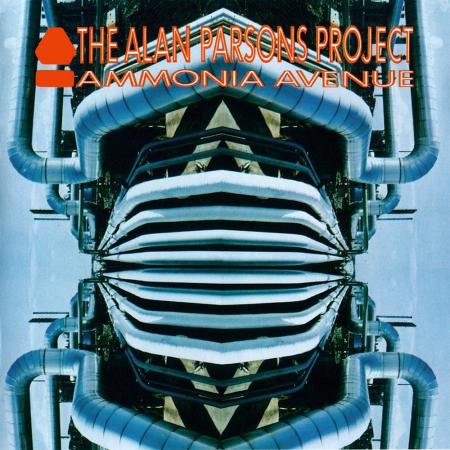
The title of the album was inspired by Eric Woolfson’s visit to Imperial Chemical Industries (ICI) in Billingham, England, (UK), where the first thing he saw was a street with miles of pipes, no people, no trees and a sign that read ‘Ammonia Avenue’. The album focuses on the possible misunderstanding of industrial scientific developments from a public perspective and a lack of understanding of the public from a scientific perspective.This album was the second of three recorded on analogue equipment and mixed directly to the digital master tape. (wikipedia)
Ammonia Avenue is the seventh studio album by the British progressive rock band The Alan Parsons Project, released on 7 December 1983 by Arista Records. The Phil Spector-influenced "Don't Answer Me" was the album's lead single, and reached the Top 15 on the US Billboard Hot 100 and Mainstream Rock Tracks charts, as well as the fourth position on the Adult Contemporary chart. The single also reached the Top 20 in several countries[4] and represents the last big hit for the Alan Parsons Project. "Prime Time" was a follow-up release that fared well in the top 40, reaching No. 34. "You Don't Believe" was the first single in November 1983, reaching #54 on Billboard Hot 100 and "Since The Last Goodbye" was a minor hit.
Ammonia Avenue is one of the band's biggest-selling albums, carrying an RIAA certification of gold and reaching the Top 10 in a number of countries
The Alan Parsons Project was a British rock band active between 1975 and 1990, whose core membership consisted of Alan Parsons and Eric Woolfson. They were accompanied by a varying number of session musicians and some relatively consistent session players such as guitarist Ian Bairnson, arranger Andrew Powell, bassist and vocalist David Paton, drummer Stuart Elliott, and vocalists Lenny Zakatek and Chris Rainbow. Parsons was an audio engineer and producer by profession, but also a musician and a composer. A songwriter by profession, Woolfson was also a composer, a pianist, and a singer. Almost all the songs on the Project's albums are credited to "Woolfson/Parsons".
The Alan Parsons Project released eleven studio albums in its 15-year career, including the successful I Robot and Eye in the Sky. Some of their most notable songs are "The Raven", "(The System of) Dr. Tarr and Professor Fether", "I Wouldn't Want to Be Like You", "Games People Play", "Time", "Snake Eyes", "Sirius"/"Eye in the Sky", "Old and Wise", and "Don't Answer Me".
Alan Parsons met Eric Woolfson in the canteen of Abbey Road Studios in the summer of 1974. Parsons acted as Assistant Engineer on the Beatles' albums Abbey Road (1969) and Let It Be (1970), engineered Pink Floyd's The Dark Side of the Moon (1973), and produced several acts for EMI Records. Woolfson, a songwriter and composer, was working as a session pianist while composing material for a concept album based on the work of Edgar Allan Poe.
Woolfson's idea was to manage Alan and help his already successful production career. This was the start of their longstanding friendly business relationship. He managed Parsons's career as a producer and engineer through a string of successes, including Pilot, Steve Harley, Cockney Rebel, John Miles, Al Stewart, Ambrosia, and the Hollies. Woolfson came up with the idea of making an album based on developments in the film industry -- the focal point of the films' promotion shifted from film stars to directors such as Alfred Hitchcock and Stanley Kubrick. If the film industry was becoming a director's medium, Woolfson felt the music business might well become a producer's medium.
Please help us keep Wikipedia growing
We use cookies on our website to provide you with the most relevant experience by remembering your preferences and repeat visits. By clicking "I Accept", you agree to the use of all cookies. Read more
Cookie SettingsReject AllI Accept
| Cookie | Duración | Descripción |
|---|---|---|
| cookielawinfo-checkbox-analytics | 11 months | This cookie is set by GDPR Cookie Consent plugin. The cookie is used to store the user consent for the cookies in the category "Analytics". |
| cookielawinfo-checkbox-functional | 11 months | The cookie is set by GDPR cookie consent to record the user consent for the cookies in the category "Functional". |
| cookielawinfo-checkbox-necessary | 11 months | This cookie is set by GDPR Cookie Consent plugin. The cookies is used to store the user consent for the cookies in the category "Necessary". |
| cookielawinfo-checkbox-others | 11 months | This cookie is set by GDPR Cookie Consent plugin. The cookie is used to store the user consent for the cookies in the category "Other. |
| cookielawinfo-checkbox-performance | 11 months | This cookie is set by GDPR Cookie Consent plugin. The cookie is used to store the user consent for the cookies in the category "Performance". |
| viewed_cookie_policy | 11 months | The cookie is set by the GDPR Cookie Consent plugin and is used to store whether or not user has consented to the use of cookies. It does not store any personal data. |